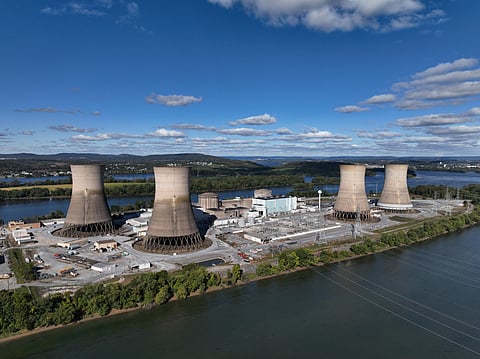
- NEWS
- the EDIT
- COMMENTARY
- BUSINESS
- LIFE
- SHOW
- ACTION
- GLOBAL GOALS
- SNAPS
- DYARYO TIRADA
- MORE

MIDDLETOWN, United States (AFP) — The planned reopening of the Three Mile Island (TMI) nuclear plant is praised as a boon for Pennsylvania and a boost for artificial intelligence (AI), but it is loathed by residents still haunted by a near-catastrophic meltdown there in 1979.
“Gas is under attack. Coal is shutting down all over this country. You got to have the base load. And nuclear is probably the most efficient base load source we have,” Pennsylvania Building and Trades Council president Robert Bair told Agence France-Presse, arguing that the reopening of the plant will benefit the entire country.
Gains could include some 3,400 jobs and $3 billion in tax revenue for the surrounding counties, according to a study by the council.
The resurrection of TMI — half of which remained operating after the 1979 meltdown, only closing down due to economic reasons in 2019 — was prompted by Microsoft’s need to fuel its power-hungry data centers.
A revolution in generative AI has triggered a surge in energy needs for those data centers, pushing cloud computing giants to look for additional low carbon energy sources.
Microsoft — which is also the biggest shareholder in OpenAI, the company at the forefront of the AI arms race — has signed a 20-year contract with TMI operator Constellation, which says all the power the plant generates will go to the Silicon Valley behemoth.
“I’m good with (the power station reopening), but that’s mainly because my best friend works for OpenAI,” joked Shay McGarvey, a bus driver in Middletown, less than three miles from the power station.
“No, actually it’s more about the amount of jobs it’s going to create,” he added.
Fear and anxiety
For others, the fear and anxiety of 1979 is still strong.
“Most residents prefer it remain closed,” said Matthew Canzoneri, chairman of the town council in Goldsboro, on the other side of the Susquehanna River on which the island is located.
“The energy produced does not directly benefit the community, and there is a definite sense of concern given TMI’s history,” he added.
A series of equipment malfunctions and human errors saw the plant’s Unit 2 melt down in 1979, releasing radioactive materials into the atmosphere and launching mass evacuations.
The accident riveted Americans for days and ushered in a new era of anxiety and regulation over nuclear energy in the United States. The worst — the rupture of the reactor vessel — was avoided, but it remains the most serious accident in the history of US commercial nuclear power.
